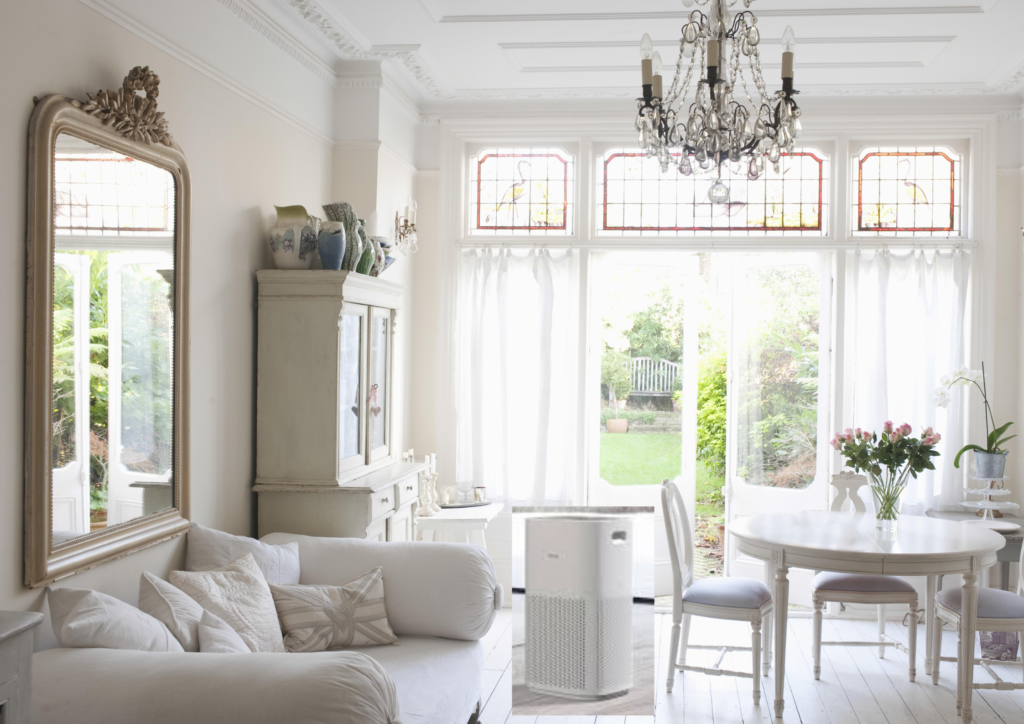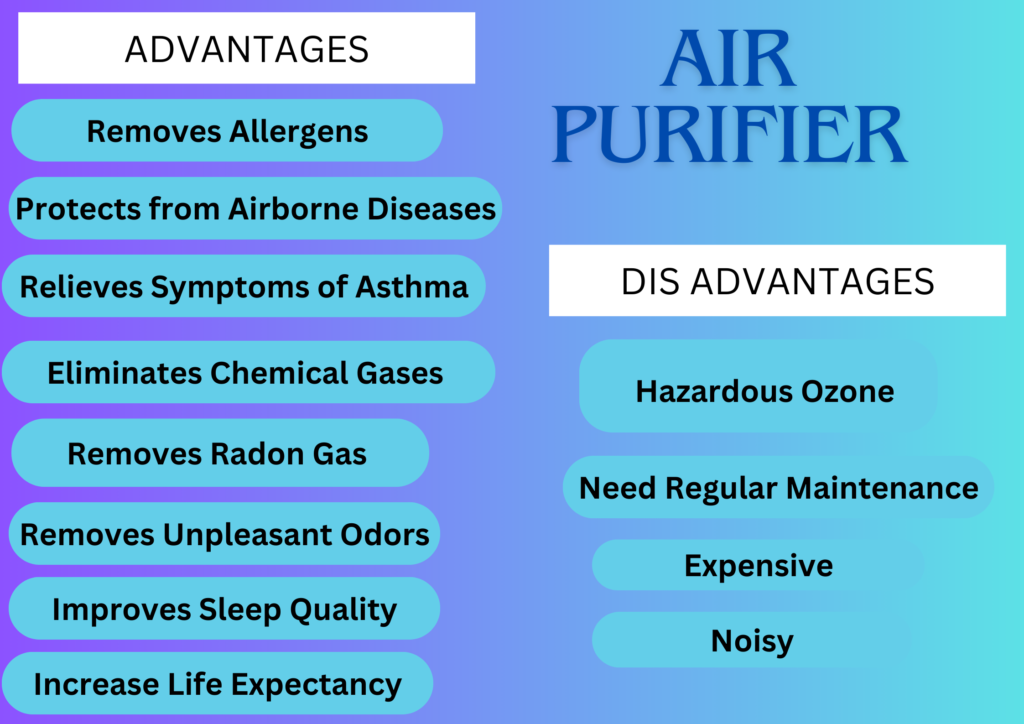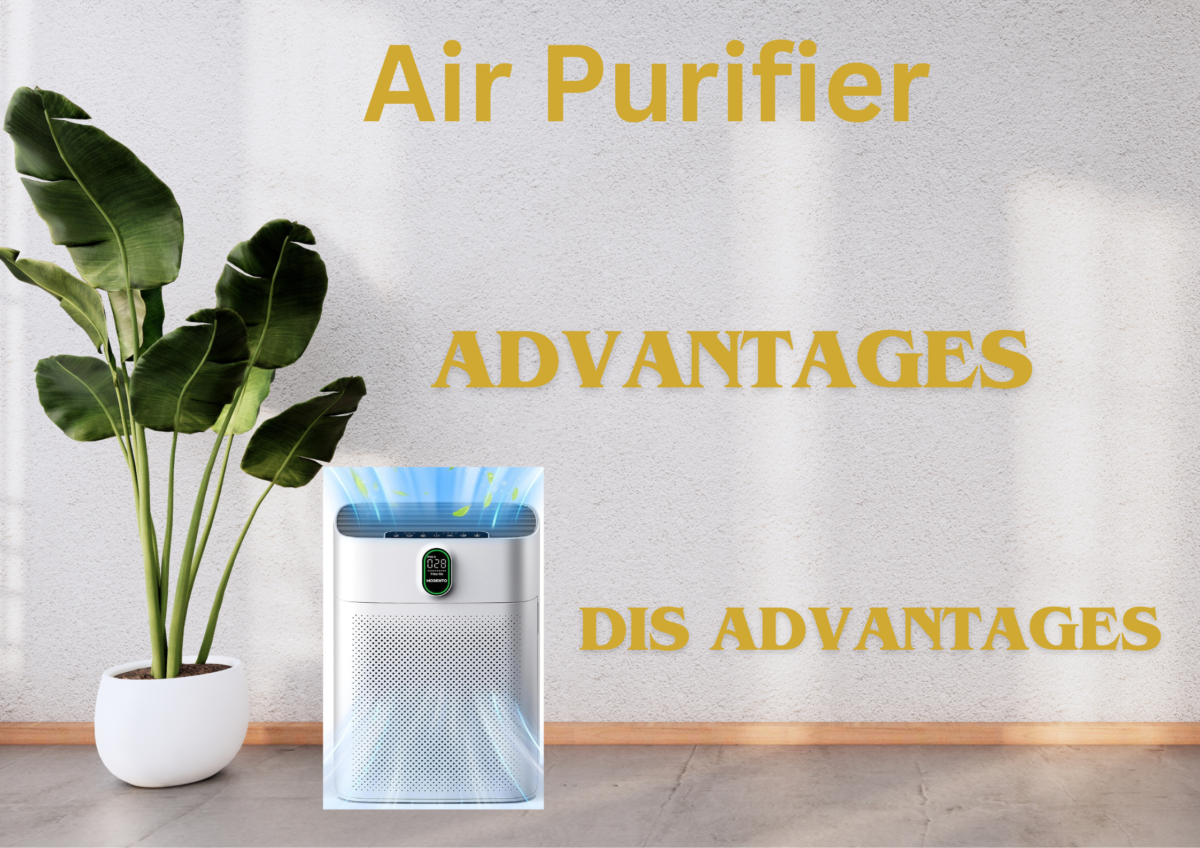Indoor air pollutants like dust, pollen, pet hairs, chemical gases, etc. cause various health issues including respiratory diseases, lung infections, asthma, and allergic symptoms. The poor air quality inside the home decreases life expectancy.
According to the Environmental Protection Agency, the severity of human exposure to indoor air pollution is two to five times higher than outdoor air pollution. So, maintaining the indoor air quality level is very important.
The air quality can be improved by removing the pollutants from the air. This is achieved by installing an air purifier inside your room. It traps air pollutants, provides you with fresh and clean air, and also keeps you protected from various health issues.
Are purifiers worth it? Read the full article and get to know about the air purifier advantages and disadvantages.
What Is an Air Purifier?
An air purifier is a portable device that removes pollutants, allergens, and other contaminants from the air. It contains a fan that draws in the indoor air inside the device and a filter that traps these unwanted particles to prevent them from circulating in the air. It supplies clean air back into the room. This process repeats several times in an hour to purify the indoor air.
Air purifier helps to improve the indoor air quality. It purifies the air by implementing any specific filtration technology. Air purifiers with various filtration technologies like HEPA filters (High-Efficiency Particulate Air), UV filters, fiberglass filters, pleated filters, and electrostatic filters, etc. are available in the market.
An air purifier offers several benefits including health, environmental, and additional benefits. It has also some potential downsides which will be discussed later in this article.
Basic Working Principle of an Air Purifier
An air purifier has 3 main components a motor, a fan, and a filter. The motor and fan draw in the surrounding air inside a room. Then the air passes through the filters to remove the contaminants from the air.
The types of air purifiers vary based on several types of filtration technology. The working principles of some of the important ones are discussed below.
- Mechanical filtration technology:
This is the most commonly used filtration technology for air purifiers. The widely used HEPA filters belong to this category. Mechanical filtration technology uses a fibrous filter that attracts dust mites, pollens, etc. into it and the purified fresh air recirculates back into the room. The dust buildup in these filters needs to be cleaned at regular intervals for optimal results.
- Electrostatic precipitation:
These air purifiers are based on the principle of electromagnetism. The polluted air passes through the ionization section first where the electrical charges are added to particles. The opposite charge flat surface attracts the charged particles into it and the purified air circulates into the room. This filtration technology can remove fine particles from the air.
- Adsorption:
This technology uses an exothermic process to remove gas molecules from the air. To achieve this, adsorption filtration technology uses a material with a high internal surface area, a suitable pore structure, and surface chemistry.
The activated carbon filters use this technology to remove chemical gases, smoke, unpleasant odors from the kitchen, wall paints, perfumes, etc. from the room.
- Photocatalysis:
The photocatalytic air purifiers use UV light and a catalyst to purify the air. The UV light energies the catalyst which attracts the harmful pollutants and destroys them. Later the purified air supplies into the room.
The main drawback of this method is it releases ozone which is very harmful and can damage lung tissue.

Advantages of Air Purifier
Health Benefits of Air Purifiers:
Removes Allergens:
Indoor air is often loaded with allergy triggers such as dust, mold spores, pollen, pet hairs, etc. If a person is allergic then exposure to this environment may cause sneezing, nasal congestion, itchy eyes, runny nose, etc. An air purifier traps and eliminates these allergens from the surrounding air and offers you clean and fresh air to breathe.
You can install it anywhere in your home where you spend most of your time like bedroom, living room, etc. To get its maximum benefits turn it on and keep it around you and enjoy the fresh air.
Protects from Airborne Diseases:
When one member of the family catches the flu, the rest of the family members get affected soon. This is due to the bacteria or viruses that are spread through tiny pathogens in the air and can be transmitted through small respiratory droplets.
The air purifiers capture bacteria and viruses and stop them from spreading from one person to another. By installing an air purifier in your home you can safeguard yourself and your family from the common cold, flu, and other airborne diseases.
HEPA and PICO filters have been found to remove particles containing coronaviruses, and flu strains from the air. The PICO filters have the capability of inactivating them up to 99.9% on a single pass.
Relieves Symptoms of Asthma:
Asthma patients have inflamed bronchial tubes. Airborne pollutants such as dust mites, pollen, and pet hair irritate the airways when they travel through the respiratory system. This triggers asthma symptoms and causes difficulty in breathing.
A HEPA air purifier is rated to eliminate at least 99.97% of pollen, dust, and other pollutants of 0.3 microns in size. But the ozone generators are not recommended for households with asthma patients as the ozone can harm the cells in the lungs and worsen the asthma symptoms.

Environmental Benefits of Air Purifiers:
Eliminates Chemicals from The Indoor Air:
If you live in a city with high motor vehicle traffic, outdoor air pollution may affect the indoor air that you breathe in. Even inside closed doors, the air can be filled with harmful chemical gases like nitrogen dioxide, carbon monoxide, etc.
Some cleaning agents also emit chemicals such as chlorine, formaldehyde, ammonia, benzene, etc. Exposure to these gases for a long period causes serious health issues like tumors, lung cancer, neurological disorders, etc.
Air purifiers use advanced filtration technology like HEPA filters and carbon filtering methods that can purify these chemical contaminants from the air. Air purifiers trap these chemicals and recirculate the clean and fresh air into the room.
Removes Radon Gas
Building materials like granite, rocks, soil, etc. emit radon gas which again produces naturally occurring radioactive elements like uranium. The radon gas leaks into the environment through the cracks on the floors, and walls. These gases can damage the lining of the lungs and cause lung cancer.
The HEPA and activated carbon filters trap the radon particles and protect you from their harmful effects. So, use an air purifier to save yourself and your family from the dangerous radon gas.
Less Dust Builds up:
The dust in the air has several forms including dust mites, dirt skin cells, pollen, pet dander, hair fragments, dirt, molds, etc. It gradually covers the surfaces in the home. The air purifier traps these dust particles from the air before they settle on the surfaces.
Removes Unpleasant Odors:
If you are struggling with some strong smells from cooking, furniture, pets, paints, sprays, and air fresheners then an air purifier can help you with this. The unpleasant odors are due to some chemicals like benzene, gasoline, formaldehyde, etc.
These odors inside a room cause difficulty in breathing, nausea, and also lower productivity and performance.
Air purifiers with HEPA and activated carbon filters trap these odors, remove them from the environment, and circulate clean and fresh air back into the room.
Additional Benefits of Air Purifiers
Improves Sleep Quality:
The dust mites, bacteria, viruses, pollen, pet hairs, and other allergens trigger allergies and cause nasal congestion, runny nose, irritated eyes, sneezing, etc. If this happens regularly then it leads to sleep disruptions.
Installing an air purifier inside your bedroom can protect you from getting affected by airborne particles. This helps you improve your sleep quality and makes you feel much more rested, energetic, and productive during the day.
Increase Life Expectancy:
Breathing good quality air can make your cardiac, respiratory, and even neurological systems healthier. An air purifier traps the fine particles from the air and stops them from penetrating the blood-brain barrier. Thus, it protects you from several health issues and helps in increasing life expectancy.
Disadvantages of Air Purifiers
- Hazardous Ozone: Some air purifiers produce ozone which can harm the cells in the lungs and respiratory airways. This also causes difficulty in breathing, coughing, chest tightness, etc. So, it is recommended to avoid these types of air purifiers that release ozone into the environment.
- Expensive: Air purifiers with advanced filtration technology can be expensive sometimes. Air purifiers are available with various improved technologies and in various ranges. If you are on a budget check the models thoroughly, and select according to your requirements.
- Need Regular Maintenance: Air purifiers need regular maintenance to work effectively. You have to change the filters and clean them properly at regular intervals to get the maximum benefit from it.
- Noisy: The mechanical filters in air purifiers sometimes cause noises.
Points to Remember Before Buying an Air Purifier
Cost of Replacement filter:
To maintain the efficiency of an air purifier, its filters should be replaced at regular intervals. Before buying do not forget to check the cost of the replacement filter. The cost of these filters varies from 20$ to 200$.
CADR (Clean Air Delivery Rate):
Before buying, check the CADR rating of an air purifier. It represents the rate at which the air purifier can deliver purified air free from dust, pollen, contaminants, etc. inside a room. The CADR rating specifies the purification rate in cubic feet per minute.
Filter Type:
It is recommended to select a HEPA filter for a room. According to the Environmental Protection Agency, this filter can remove at least 99.97% of dust, pollen, mold, bacteria, and any other airborne pollutants with a size of 0.3 microns.
Room Size:
First, select the room for which you need an air purifier. It is not recommended to buy a more powerful air purifier for a small size room.
Noise Level:
While purchasing, check the noise factor written in the decibel rating on the air purifier.
Conclusion
Good indoor air quality leads to a healthy lifestyle. An air purifier prevents the spreading of airborne diseases and reduces asthma and allergic symptoms. It helps create a fresh and clean environment by removing unpleasant odors, chemical gases, dust mites, radon gas, etc. from the air. Installation of an air purifier inside your bedroom improves sleep quality. The fresh air around you keeps you healthy and productive throughout the day.
The major drawback of photocatalytic air purifiers is the emission of ozone to the environment which can damage lung tissue. So, you should avoid buying this type of air purifier.
FAQS
- Is there any disadvantage of an air purifier?
The emission of ozone from photocatalytic air purifiers is the major disadvantage. It causes harmful diseases like lung cancer, difficulty in breathing, coughing, chest tightness, etc. Some other minor drawbacks include its cost, the noise produced by the mechanical filters, and the need for regular maintenance.
2. Is an air purifier good for health?
Yes, the air purifier is good for health. If you are using it for a long time, it keeps you protected from various health issues related to polluted air. It improves indoor air quality and also helps increase a person’s life expectancy.
Also Read
- How Do Air Purifiers Help? 6 Benefits
- Whole House Dehumidifier: Types, Working Principle, Pros, Cons 2024
- How Does a Commercial Dehumidifier Work? 2024
- How Does a Dehumidifier Work? Types, Uses, Benefits 2024
- 10 Tips for Buying a Dehumidifier
- Dehumidifier Vs Air Purifier 2024
- Dehumidifier vs. Air Conditioner 2024
- Cool Mist Humidifier: Types, Uses, Benefits, Working Principle 2024
- Do Humidifiers Help with Air Quality? 2024
- When Do You Need a Humidifier? 8 Common Signs
- How Do Humidifiers Work? A Complete Guide 2024
- How Humidifier Helps Breathing? 2024
- Humidifier Vs Dehumidifier Vs Air Purifier: Which One Should You Buy? 2024


17 thoughts on “Air Purifier Advantages and Disadvantages”